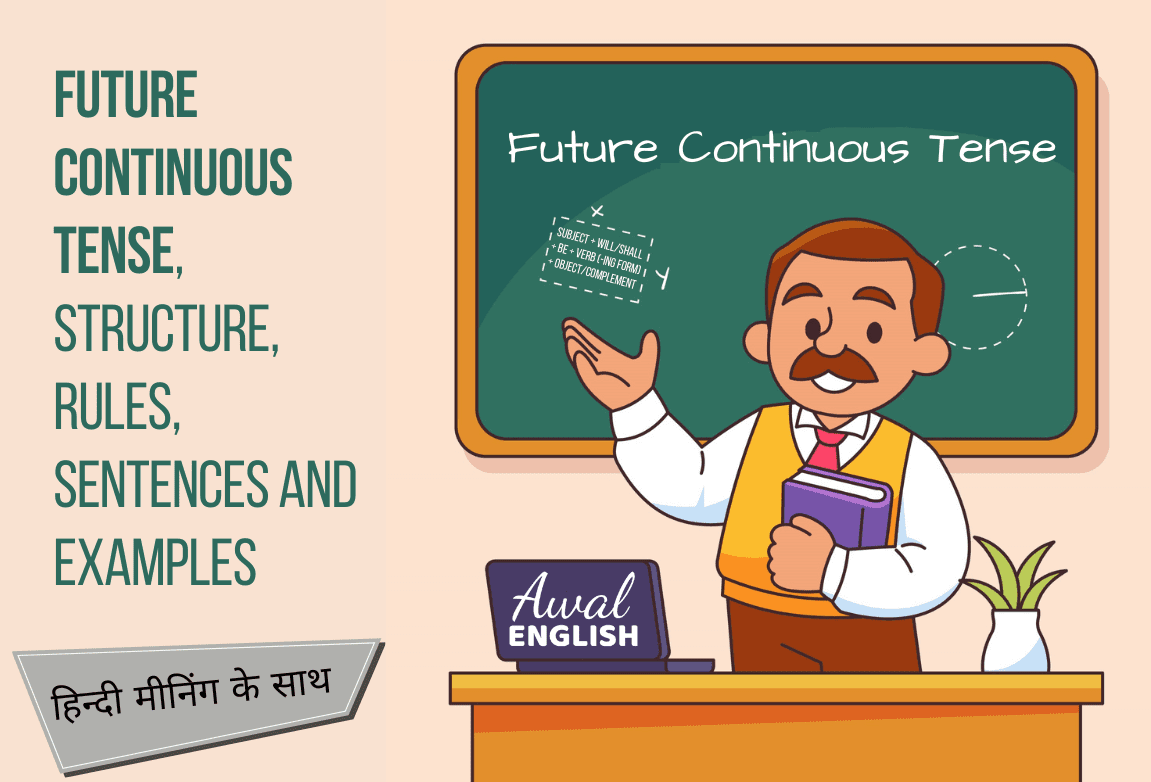
Future Continuous Tense: अपूर्ण भविष्यत काल
Tenses are fundamental in English grammar, and the Future Continuous Tense is essential for describing actions that will be ongoing at a specific time in the future. In this blog, we will delve into the Future Continuous Tense in Hindi, exploring its structure, rules, and examples.
Here you will learn about the Future Continuous Tense in Hindi, including its rules, structure, sentences, and Future Continuous examples. This knowledge will support your English learning journey, much like an online spoken English course.
इस blog में आप Future Continuous Tense के बारे में सीखेंगे, जिसमें हम इसके rules, structure, और examples पर ध्यान देंगे।
A Look at the Future Continuous Tense
The Future Continuous Tense describes actions that will be happening or ongoing at a specific moment in the future. It is used for actions that will be in progress at some time but will not yet be completed. The form of verbs in this tense includes a future auxiliary verb (will/shall) and the present participle (verb + -ing).
Future Continuous Tense उन क्रियाओं को describe करता है जो भविष्य में किसी विशेष समय पर हो रही होंगी। इसमें “will” या “shall” और “-ing” वाला क्रियापद होता है।
Definition of Future Continuous Tense
The Future Continuous Tense is used to describe actions that will happen at a specific future time or actions that will be temporarily ongoing in the future.
Future Continuous Tense वह tense होता है जिसका use ऐसी situations के लिए किया जाता है जो future में किसी specific समय पर चल रही होंगी या temporarily रूप से हो रही होंगी।
सीखें Simple Future Tense बिना Grammar में उलझे through this video
Structure and Formula of Future Continuous Tense
The structure of the Future Continuous Tense is based on the following formula:
Subject + will/shall + be + Verb (-ing form) + Object/Complement
Here:
–Subject: The person or thing performing the action.
–will/shall be: The future auxiliary verb used according to the subject.
–Verb (-ing form): The main verb in its present participle form.
–Object/Complement: Additional information or the person/thing affected by the action.
–Future Continuous Tense का structure बहुत आसान होता है, जहाँ subject के साथ will/shall का use होता है और verb की -ing form लगती है।
Types of Future Continuous Tense
There are four main types of Future Continuous Tense sentences:
1. Assertive Sentence
Formula: Subject + will/shall + be + Verb (-ing) + Object
Examples:
I shall be going to the market tomorrow.
मैं कल market जा रहा हूँ।
He will be studying hard for his exam.
वह अपनी exam के लिए कड़ी मेहनत कर रहा होगा।
She will be painting the masterpiece from tomorrow.
वह कल से masterpiece की painting करेंगी।
You shall be leading the project next week.
आप अगले सप्ताह इस project को lead करेंगे।
They will be discussing the trip next month.
वे अगले महीने trip पर चर्चा करेंगे।
2. Negative Sentence
Formula: Subject + will/shall + not + be + Verb (-ing) + Object
Examples:
We will not be coming to the function the day after.
हम अगले दिन function में नहीं आएंगे।
He shall not be working for his presentation next Monday.
वह अगले सोमवार को अपनी presentation के लिए काम नहीं करेंगे।
I will not be practising football for the upcoming match.
मैं upcoming match के लिए football practice नहीं करूंगा।
They shall not be returning from America tomorrow.
वे कल America से नहीं लौटेंगे।
She will not be cooking lunch for us.
वह हमारे लिए दोपहर का खाना नहीं बना रही होगी।
3. Positive Interrogative Sentence
Formula: Will/Shall + Subject + be + Verb (-ing) + Object?
Examples:
Will she be going to the market tomorrow?
क्या वह कल market जा रही होगी?
Will he be singing at the function next week?
क्या वह अगले सप्ताह function में गाएंगे?
Shall I be joining you at the party?
क्या मैं आपके साथ party में शामिल होऊंगा?
Will they be travelling next month?
क्या वे अगले महीने travel कर रहे होंगे?
Shall you be performing next Tuesday?
क्या आप अगले मंगलवार को perform कर रहे होंगे?
4. Negative Interrogative Sentence
Formula: Will/Shall + Subject + not + be + Verb (-ing) + Object?
Examples:
Will you not be going to your home next week?
क्या आप अगले सप्ताह अपने घर नहीं जायेंगे ?
Shall I not be returning next month before your birthday?
क्या मैं अगले महीने तुम्हारे जन्मदिन से पहले नहीं लौट रहा हूँ?
Will they not be eating lunch with us tomorrow?
क्या वे कल हमारे साथ दोपहर का भोजन नहीं करेंगे?
Will she not be discussing the project this evening?
क्या वह आज शाम को project पर चर्चा नहीं कर रही होगी?
Will he not be travelling tomorrow?
क्या वह कल यात्रा नहीं करेगा?
Some WH Sentences Example of Future Continuous Tense
The Future Continuous Tense can also be used in WH (question words like who, what, where, why, when, and how) sentences to inquire about ongoing actions or situations. The WH word is placed at the beginning of the sentence, followed by the auxiliary verb (will/shall be).
Future Continuous Tense का use WH शब्दों (जैसे कौन, क्या, कहाँ, क्यों, कब, कैसे) के साथ भी किया जा सकता है जिससे हम किसी भविष्य की चल रही क्रिया या स्थिति के बारे में पूछ सकते हैं। WH शब्द वाक्य की शुरुआत में आता है और इसके बाद will/shall be का use होता है।
WH questions with Future Continuous Tense:
What will you be eating for dinner tonight?
आज रात के खाने में आप क्या खा रहे होंगे?
I will be eating rice for dinner tonight.
मैं आज रात के खाने में चावल खा रहा हूँ
What shall we be doing this Sunday?
इस रविवार को हम क्या कर रहे होंगे?
We shall be doing some shopping this Sunday.
हम इस रविवार को shopping कर रहे होंगे।
How will she be travelling to Delhi next month?
वह अगले महीने Delhi की यात्रा कैसे करेगी?
She will be travelling by air to Delhi next month.
वह अगले महीने airways से दिल्ली की यात्रा करेंगी।
Where will we be staying tomorrow?
हम कल कहाँ ठहरेंगे?
We will be staying at my aunt’s place tomorrow.
हम कल अपनी मौसी के यहाँ ठहरेंगे।
When will he be coming for the meeting?
वह meeting के लिए कब आ रहे होंगे?
He will be coming for the meeting at 3 pm.
वह दोपहर 3 बजे meeting के लिए आएंगे।
5 Exceptions to the Rule of Future Continuous Tense:
Stative Verbs:
Certain verbs that express a state or condition (e.g., believe, love, know, understand) are generally not used in the future continuous tense.
Stative verbs वे क्रियाएँ होती हैं जो किसी अवस्था या स्थिति को express करती हैं (जैसे: विश्वास करना, प्यार करना, जानना, समझना)। इनका use आमतौर पर Future Continuous Tense में नहीं किया जाता।
Example:
Incorrect: She will be loving the movie.
Correct: She will love the movie.
Non-action Verbs:
Verbs that describe possession or mental states (e.g., own, want, seem) are typically not used in the future continuous tense.
Non-action verbs वे क्रियाएँ होती हैं जो किसी अधिकार या मानसिक स्थिति का वर्णन करती हैं (जैसे: मालिक होना, चाहना, प्रतीत होना)। इनका use आमतौर पर Future Continuous Tense में नहीं किया जाता।
Example:
Incorrect: She will be owning a car.
Correct: She will own a car.
Repeated Actions:
The future continuous tense is not used for habitual or repeated actions. Instead, the simple future tense is more suitable.
Future Continuous Tense का use habitual या repeated कार्यों के लिए नहीं किया जाता। इसके बजाय Simple Future Tense का use अधिक suitable होता है।
Example:
Incorrect: He will be going to the gym every day.
Correct: He will go to the gym every day.
Fixed Schedules:
The future continuous tense is not used to describe fixed scheduled events. Simple future tense is preferred in such cases.
Future Continuous Tense का use fixed scheduled वाले events के लिए नहीं किया जाता है। ऐसे मामलों में Simple Future Tense का use अधिक suitable होता है।
Example:
Incorrect: The train will be arriving at 9 AM.
Correct: The train will arrive at 9 AM.
Immediate Future:
For actions happening in the near future, the simple future tense is more appropriate.
Future Continuous Tense का use near future में होने वाली क्रियाओं के लिए नहीं किया जाता। इसके बजाय Simple Future Tense का use अधिक appropriate होता है।
Example:
Incorrect: We will be having a meeting tomorrow.
Correct: We will have a meeting tomorrow.
What Do You Use Future Continuous Tense For?
Uses of the Future Continuous Tense :
Describing actions that will be happening at a specific moment in the future.
For example: “He will be reading a book.”
Describing temporary situations or actions in the future.
For example: “She will be staying with us for a week.”
Indicating future plans or arrangements that will be in progress.
For example: “We will be going to the beach next weekend.”
Expressing ongoing or progressive actions that will take place in the future.
For example: “They will be working on a new project.”
Future Continuous Tense का use भविष्य में किसी specific समय पर चल रही क्रियाओं, अस्थायी स्थितियों, भविष्य की योजनाओं, और लगातार हो रही गतिविधियों को describe करने के लिए किया जाता है।
General Rules to Form Future Continuous Tense
Here are some key rules to follow while forming the Future Continuous Tense:
- Use the correct form of the auxiliary verb ‘will/shall be’ based on the subject.
For example: “I will be going,” “She will be studying,” “They will be working.” - Add -ing to the base form of the verb.
For example: “play” becomes “playing,” “write” becomes “writing.” - Ensure the sentence structure follows the formula: Subject + will/shall be + Verb (-ing) + Object.
For example: “She will be cooking dinner.” - Be mindful of verb spelling changes when adding -ing.
For example: “run” becomes “running,” “swim” becomes “swimming.”
Future Continuous Tense के लिए सही auxiliary verb ‘will/shall be’ का use करें, verb की base form में -ing जोड़ें और confirm करें कि वाक्य का use सही से हो।
Where Not to Use Future Continuous Tense
Do not use the Future Continuous Tense where it is not appropriate:
For routine actions or universal facts.
Instead of “He will be going to school every day,” say “He will go to school every day.”
For actions that will be completed or fixed arrangements.
Instead of “She will be finishing her homework now,” say “She will finish her homework now.”
For upcoming plans when a simple future tense fits better.
Instead of “We will be having dinner tomorrow,” say “We will have dinner tomorrow.”
Future Continuous Tense का use आदतों, सच्चाई, या तय कामों के लिए नहीं होता। जैसे “वह रोज़ school जा रहा होगा” की जगह “वह रोज़ school जाएगा” कहना सही है।
Verbs That Cannot Be Used With Future Continuous Tense
Some verbs are not typically used in the Future Continuous Tense, including:
Stative Verbs: These are verbs that express a condition or state of being, rather than an action.
Examples: to admire, to recognize, to possess.
Dynamic Verbs with Progressive Meanings: Some dynamic verbs imply ongoing actions and are usually expressed in the Future Continuous Tense.
Examples: to learn, to engage, to jog, to dive.
Future Continuous Tense में कुछ verbs जैसे कि stative verbs और कुछ dynamic verbs का use सामान्यत: नहीं किया जाता।
Examples of Future Continuous Tense
Here are some sentences using Future Continuous Tense to illustrate its use:
I will be reading a book.
मैं एक किताब पढ़ रहा होऊंगा।
She will be writing a letter.
वह एक letter लिख रही होगी।
We will be travelling to Paris.
हम Paris की यात्रा कर रहे होंगे।
He will be cooking dinner.
वह रात का खाना बना रहा होगा।
They will be watching a movie.
वे एक movie देख रहे होंगे।
You will be studying hard.
आप मेहनत से पढ़ाई कर रहे होंगे।
Future Continuous Tenses Practice Questions
Identify and tick the Future Continuous Tenses:
He will be attending a meeting tomorrow.
वह कल एक meeting में भाग लेंगे।
She is not writing articles.
वह लेख नहीं लिख रही है।
I am not going to the market.
मैं market नहीं जा रहा हूँ।
He shall be eating dinner with us tonight.
वह आज रात हमारे साथ खाना खा रहा होगा।
We will be travelling to Mumbai next month.
हम अगले महीने Mumbai की यात्रा करेंगे।
She will sing a song at the concert.
वह concert में गाना गाएंगी।
They shall be buying gifts for the children.
वे बच्चों के लिए gifts खरीदेंगे
You will be staying here for a week.
आप यहां एक सप्ताह तक रहेंगे।
They are not talking to us for no reason.
वे हमसे अकारण बात नहीं कर रहे हैं।
I shall be taking a rest this Saturday.
मैं इस शनिवार को rest करूँगा।
Future Continuous Tense fill-in-the-blanks exercise:
- I ___ (watch) a movie when you call.
- They ___ (play) football in the park tomorrow.
- She ___ (read) a novel at 5 PM tomorrow.
- We ___ (wait) for the bus at that moment.
- The kids ___ (swim) in the pool this morning.
- My parents ___ (travel) to London next week.
- He ___ (study) for his exams when the lights go out.
- You ___ (make) a cake when I arrive.
- The birds ___ (fly) in the sky this afternoon.
- I ___ (learn) how to cook when I live there.
Answers:
- will be watching
- will be playing
- will be reading
- will be waiting
- will be swimming
- will be travelling
- will be studying
- will be making
- will be flying
- will be learning
Future Continuous Tense: Active and Passive Voice Exercise
Below is an exercise designed to help you practise converting active voice sentences into passive voice in the Future Continuous Tense.
Exercise:
- They will be decorating the hall for the event.
- The kids will be drawing pictures in the classroom.
- The delivery person will be bringing the package.
- Scientists will be conducting experiments on climate change.
- The chef will be preparing a special dish for dinner.
- Workers will be renovating the old building.
- The editor will be reviewing the manuscript.
Answers (Passive Voice):
- The hall will be decorated for the event by them.
- Pictures will be drawn in the classroom by the kids.
- The package will be brought by the delivery person.
- Experiments will be conducted by scientists on climate change.
- A special dish will be prepared by the chef for dinner.
- The old building will be renovated by the workers.
- The manuscript will be reviewed by the editor.
Frequently Asked Questions
1. What is the main function of the Future Continuous Tense?
Answer: The Future Continuous Tense primarily describes actions that will be happening at a specific moment or ongoing in the future.
Example: She will be cooking dinner at 5 PM.
2. How do I construct a sentence in the Future Continuous Tense?
Answer: To form a sentence in the Future Continuous, use the subject + auxiliary verb (will be) + the main verb with -ing.
Example: We will be watching a movie.
3. Can the Future Continuous Tense be used to describe temporary activities?
Answer: Yes, this tense is often used to describe temporary activities or actions that will not be permanent in the future.
Example: I will be staying with my friend for a week.
4. Is the Future Continuous Tense used for future plans?
Answer: Yes, the Future Continuous Tense can be used to describe future plans that will be ongoing at a particular time.
Example: We will be flying to Paris next week.
5. Can the Future Continuous Tense be used for repeated actions?
Answer: The Future Continuous Tense can express repeated actions if they will be happening around a specific time in the future.
Example: He will be constantly calling me next week.
Conclusion
We hope this blog on the Future Continuous Tense in Hindi has helped you understand the details of this tense. We have covered the structure, rules, and usage of the Future Continuous Tense. This understanding will assist you in practising English speaking and becoming fluent in spoken English. If you are looking for the best English-speaking course online, you can join a Spoken English Course.






S